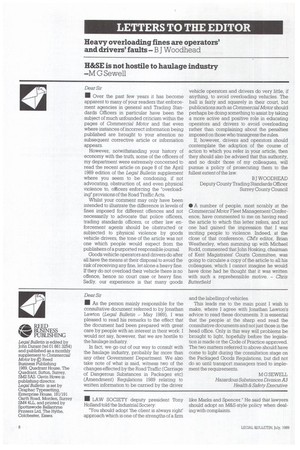LETTERS TO THE EDITOR
Page 116

If you've noticed an error in this article please click here to report it so we can fix it.
Dear Sir I. Over the past few years it has become apparent to many of your readers that enforcement agencies in general and Trading Standards Officers in particular have been the subject of much unfounded criticism within the pages of Commercial Motor and that even where instances of incorrect information being published are brought to your attention no subsequent corrective article or information appears.
However, notwithstanding your history of economy with the truth, some of the officers of my department were extremely concerned to read the recent article on page 8 of the April 1989 edition of the Legal Bulletin supplement where you seem to be condoning, if not advocating, obstruction of, and even physical violence to, officers enforcing the "overloading" provisions of the Road Traffic Acts.
Whilst your comment may only have been intended to illustrate the difference in levels of fines imposed for different offences and not necessarily to advocate that police officers, trading standards officers, or other law enforcement agents should be obstructed or subjected to physical violence by goods vehicle drivers, the tone of the article was not one which people would expect from the publishers of a purported responsible journal.
Goods vehicle operators and drivers do after all have the means at their disposal to avoid the risk of receiving any fine, let alone a heavy fine. If they do not overload their vehicle there is no offence, hence no court case or heavy fine. Sadly, our experience is that many goods Dear Sir 111 As the person mainly responsible for the consultative document referred to by Jonathan Lawton (Legal Bulletin May 1989), 1 was pleased to read his remarks to the effect that the document had been prepared with great care by people with an interest in their work. I would not say, however, that we are hostile to the haulage industry.
In fact, we go out of our way to consult with the haulage industry, probably far more than any other Government Department. We also take note of what is said, witness two of the changes effected by the Road Traffic (Carriage of Dangerous Substances in Packages etc) (Amendment) Regulations 1989 relating to written information to be carried by the driver • LAW SOCIETY deputy president Tony Holland told the Industrial Society: "You should adopt 'the client is always right' approach which is one of the strengths of a firm
vehicle operators and drivers do very little, if anything, to avoid overloading vehicles. The ball is fairly and squarely in their court, but publications such as Commercial Motor should perhaps be doing something to assist by taking a more active and positive role in educating operators and drivers to avoid overloading rather than complaining about the penalties imposed on those who transgress the rules.
If, however, drivers and operators should contemplate the adoption of the course of action to which you refer in your article, then they should also be advised that this authority, and no doubt those of my colleagues, will pursue a policy of prosecuting them to the fullest extent of the law.
B J WOODHEAD Deputy County Trading Standards Officer Surrey County Council
• A number of people, most notably at the Commercial Motor Fleet Management Conference, have commented to me on having read the article to which this letter refers, and not one had gained the impression that I was inciting people to violence. Indeed, at the close of that conference, Cies editor, Brian Weatherley, when summing up with Michael Rodd, commented that John Hosking, chairman of Kent Magistrates' Courts Committee, was going to circulate a copy of the article to all his colleagues, which I cannot imagine he would have done had he thought that it was written with such a reprehensible motive. Chris Butterfield
and the labelling of vehicles.
This leads me to the main point I wish to make, where I agree with Jonathan Lawton's advice to read these documents. It is essential that the people at the sharp end read the consultative documents and not just those in the head office. Only in this way will problems be brought to light, hopefully before the legislation is made or the Code of Practice approved. The two matters referred to above should have come to light during the consultation stage on the Packaged Goods Regulations, but did not do so until transport managers tried to implement the requirements.
M G SEWELL Hazardous Substances Division A3 Health & Safety Executive like Marks and Spencer." He said that lawyers should adopt an M&S-style policy when dealing with complaints.




















































































































